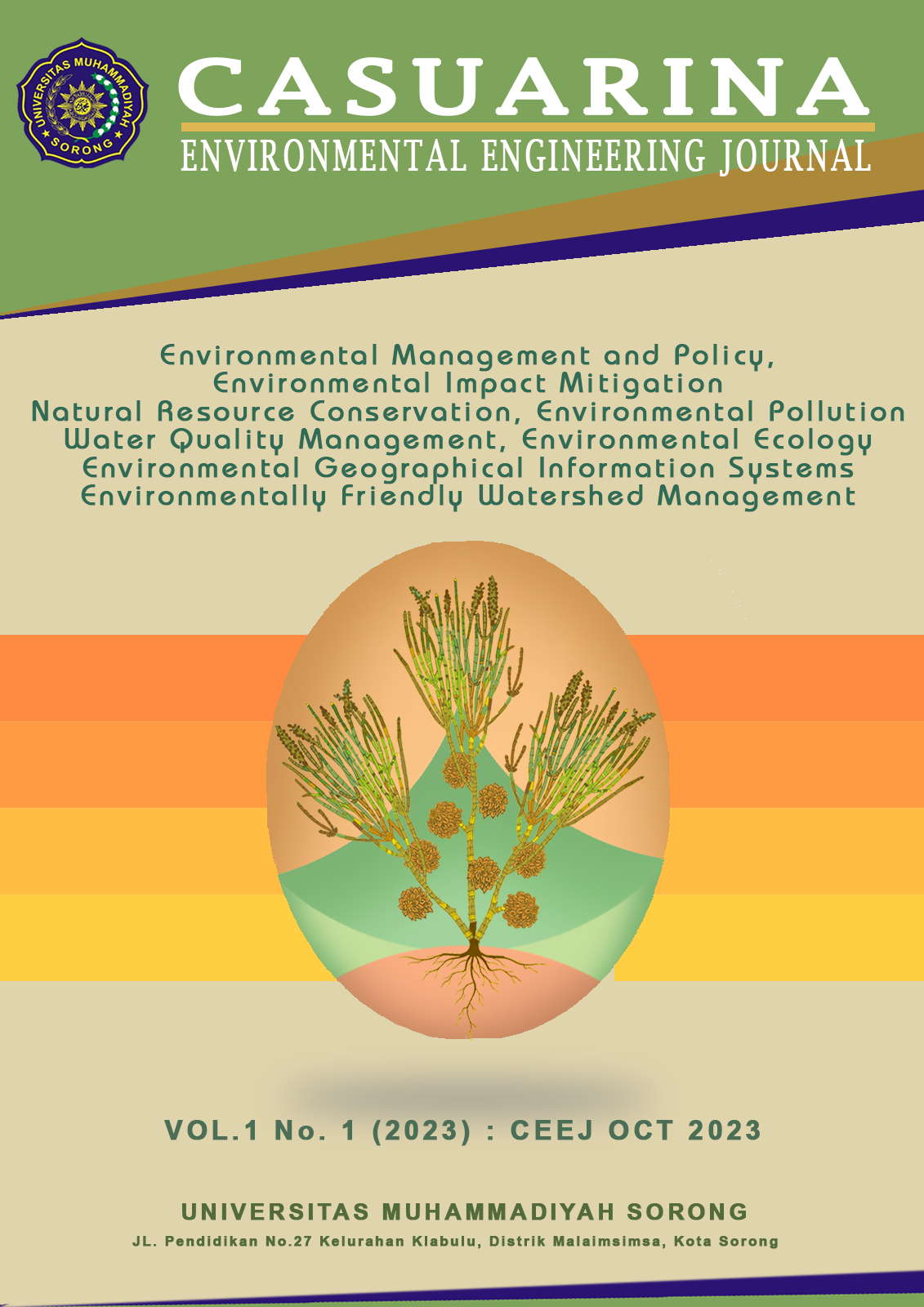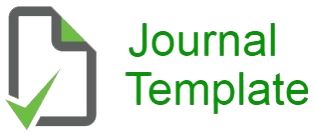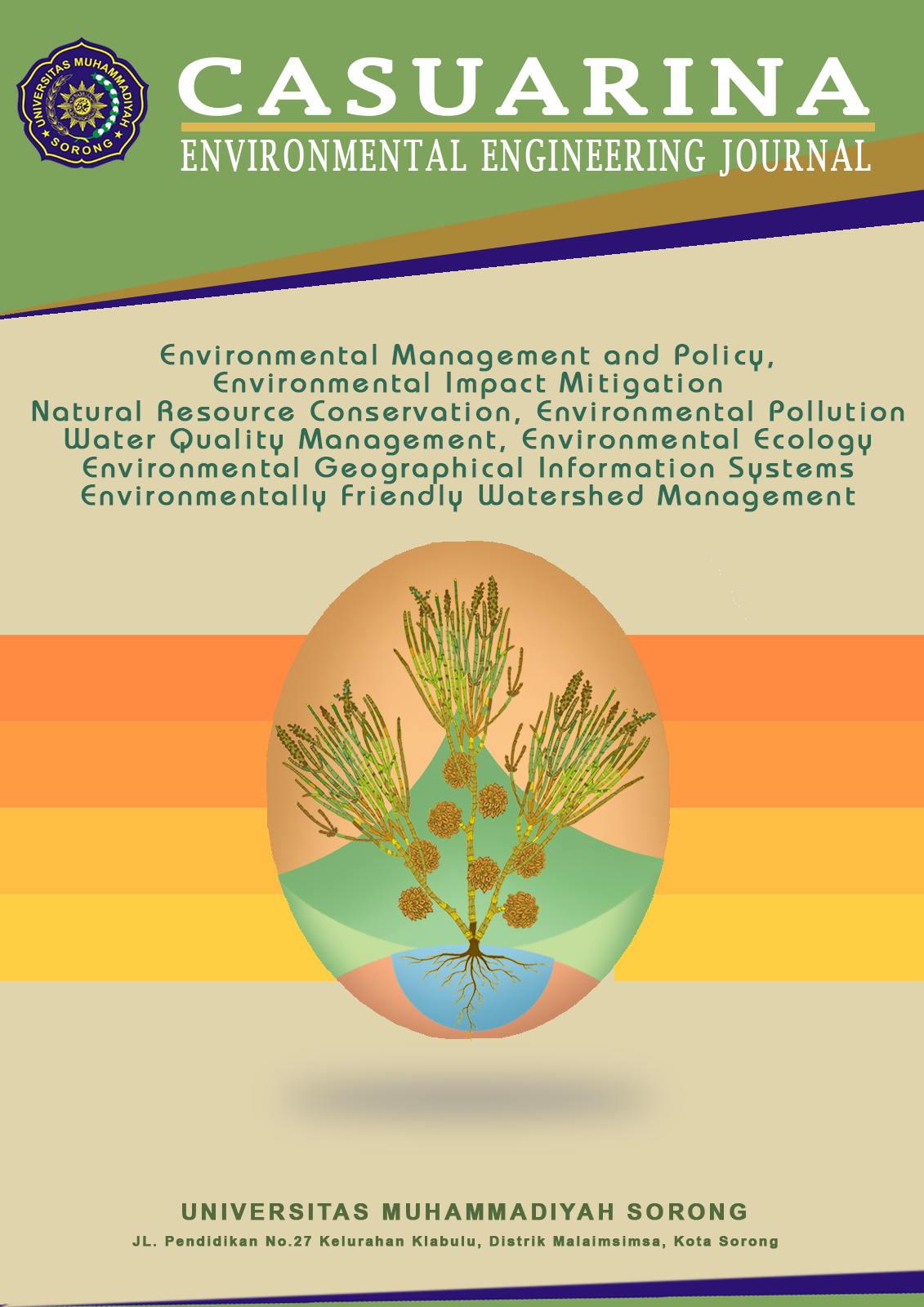IDENTIFICATION OF FLOOD PRONE AREAS IN MARIAT DISTRICT, SORONG DISTRICT USING GEOGRAPHIC SYSTEMS (GIS)
Kata Kunci:
Mapping Identification, Floods, Geographic Information SystemsAbstrak
On June 8 2019, the Mariat River, located in Mariat District, Sorong Regency, West Papua, overflowed due to high intensity and long-lasting rain, resulting in hundreds of residential units and hundreds of hectares of plantation land along the banks of the river being submerged in flood waters as high as 0.5 meters. – 1 meter. One effort that can be made to identify flood-prone areas in Mariat District, Sorong Regency is to conduct a Geographic Information System (GIS) study. This research aims to determine the distribution of flood-prone locations in Mariat District, Sorong Regency and find out how wide the flood inundation area is in each sub-district of Mariat District, Sorong Regency. The results of this research are a map of flood-prone areas in Mariat District, Sorong Regency and a map of the area of flood inundation in each sub-district of Mariat District, Sorong Regency. The research results show that the areas affected by flooding in Mariat District, Sorong Regency are only 3 sub-districts, namely Klamalu sub-district, Klasuluk sub-district and Mariyai sub-district with a percentage of 18% of the total area in the three sub-districts. Meanwhile, the area affected by flooding in Mariat District, Sorong Regency includes three sub-districts, namely Klamalu Sub-district with a flood-affected area of 1.0479 km2 or 14% of the total area of the sub-district, Klasuluk sub-district with a flood-affected area of 0.7995 km2 or 18% of the total area of the sub-district. , and Mariyai Village flood-affected area of 0.6195 km2, 40% of the total area of the Village.
Referensi
H Hendi, P Sulwan, dkk , 2014. Analisa Daerah Rawan Banjir Menggunakan Aplikasi Sistem Informasi Geografis ( Studi Kasus Kepulauan Bangka )
Irwansyah E, 2013. Sistem Informasi Perinsip Dasar Dan Pengembangan Aplikasi. Nurdiawan O, Putri H, 2018. Pemetaan Daerah Rawan Banjir Berbasis Sistem Informasi Geografis Dalam Upaya Mengoptimalkan Langkah Antisipasi Bencana.
Putra M, 2007. Pemetaan Kawasan Rawan Banjir Berbasis Sistem informasi Geografis (SIG) Untuk Menentukan Titik Dan Rute Evakuasi ( Studi kasus : Kawasan Perkotaan Pangkep, Kabupaten Pangkejane Dan Kepulauan ).
R Syannet, L Jeanne, dkk, 2014. Pemetaan Wilayah Rawan Banjir Di Kota Manado Dengan Menggunakan Sistem Informasi Geografis.
S Dita, 2016. Pemetaan Kawasan Rawan Banjir Di Das Tuweley Kabupaten Tolitoli Dengan Penerapan Sistem Informasi Geografis.
Undang-Undang Nomor 24 Tahun 2007, Penanggukangan bencana.
Undang-Undang Nomor 26 Tahun 2007, Penataan Ruang.
Unduhan
Diterbitkan
Cara Mengutip
Terbitan
Bagian
Lisensi
Hak Cipta (c) 2023 Casuarina: Jurnal Teknik Lingkungan

Artikel ini berlisensiCreative Commons Attribution-NonCommercial-ShareAlike 4.0 International License.
Please find the rights and licenses in Casuarina: Environmental Engineering Journal. By submitting the article/manuscript of the article, the author(s) agree with this policy. No specific document sign-off is required.
1. License
The non-commercial use of the article will be governed by the Creative Commons Attribution license as currently displayed on Creative Commons Attribution-NonCommercial-ShareAlike 4.0 International License.
2. Author(s)' Warranties
The author warrants that the article is original, written by the stated author(s), has not been published before, contains no unlawful statements, does not infringe the rights of others, is subject to copyright that is vested exclusively in the author, and free of any third party rights, and that any necessary written permissions to quote from other sources have been obtained by the author(s).
3. User/Public Rights
Casuarina: Environmental Engineering Journal's spirit is to disseminate articles published are as free as possible. Under the Creative Commons license, Casuarina: Environmental Engineering Journal permits users to copy, distribute, display, and perform the work for non-commercial purposes only. Users will also need to attribute authors and Casuarina: Environmental Engineering Journal on distributing works in the journal and other media of publications. Unless otherwise stated, the authors are public entities as soon as their articles got published.
4. Rights of Authors
Authors retain all their rights to the published works, such as (but not limited to) the following rights;
- Copyright and other proprietary rights relating to the article, such as patent rights,
- The right to use the substance of the article in own future works, including lectures and books,
- The right to reproduce the article for own purposes,
- The right to self-archive the article (please read our deposit policy),
- The right to enter into separate, additional contractual arrangements for the non-exclusive distribution of the article's published version (e.g., post it to an institutional repository or publish it in a book), with an acknowledgment of its initial publication in this journal (Casuarina: Environmental Engineering Journal).
5. Co-Authorship
If the article was jointly prepared by more than one author, any authors submitting the manuscript warrants that he/she has been authorized by all co-authors to be agreed on this copyright and license notice (agreement) on their behalf, and agrees to inform his/her co-authors of the terms of this policy. Sentralisasi will not be held liable for anything that may arise due to the author(s) internal dispute. Sentralisasi will only communicate with the corresponding author.
6. Royalties
Being an open accessed journal and disseminating articles for free under the Creative Commons license term mentioned, author(s) aware that Casuarina: Environmental Engineering Journal entitles the author(s) to no royalties or other fees.
7. Miscellaneous
Casuarina: Environmental Engineering Journal will publish the article (or have it published) in the journal if the article editorial process is successfully completed. Casuarina: Environmental Engineering Journal's editors may modify the article to a style of punctuation, spelling, capitalization, referencing, and usage that deems appropriate. The author acknowledges that the article may be published so that it will be publicly accessible and such access will be free of charge for the readers as mentioned in point 3.








